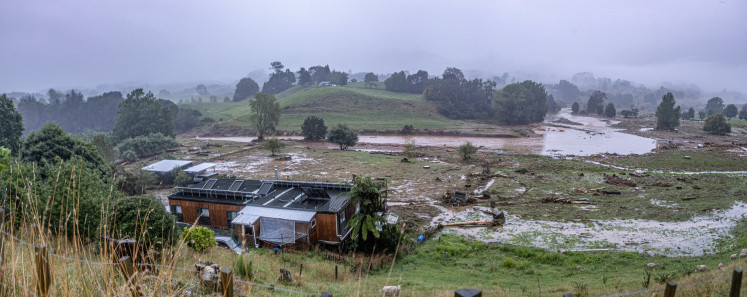Popular Reads
Top Results
Can't find what you're looking for?
View all search resultsPopular Reads
Top Results
Can't find what you're looking for?
View all search resultsTrump says US to hold nuclear talks with Iran next week
Speaking in The Hague where he attended a NATO summit on Wednesday, Trump said he did not see Iran again engaging in nuclear weapons development.
Change text size
Gift Premium Articles
to Anyone
U
nited States President Donald Trump said on Wednesday he would likely seek a commitment from Iran to end its nuclear ambitions at talks next week and credited US strikes on Iran with bringing a swift end to the war between Israel and Tehran.
Trump said his decision to unleash huge bunker-busting bombs in Sunday's attack had devastated Iran's nuclear program and called the outcome "a victory for everybody".
"It was very severe. It was obliteration," he said, shrugging off an initial assessment by the US Defense Intelligence Agency that Iran's path to building a nuclear weapon may have been set back only by months.
Meanwhile, anxious Iranians and Israelis sought to resume normal life after 12 days of the most intense confrontation ever between the two foes and a ceasefire that took effect Tuesday.
Speaking in The Hague where he attended a NATO summit on Wednesday, Trump said he did not see Iran again engaging in nuclear weapons development. Tehran has for decades denied accusations by Western leaders that it is seeking nuclear arms.
"We're going to talk to them next week, with Iran. We may sign an agreement. I don't know. To me, I don't think it's that necessary," Trump said.
"I'll tell you, the last thing they want to do is enrich anything right now. They want to recover," he said, referring to Western accusations that Iran has been enriching uranium to near-weapons-grade purity.
Later on Wednesday, US Central Intelligence Agency Director John Ratcliffe said in a statement that the US air strikes had “severely damaged” Iran’s nuclear program, but he stopped short of declaring that the program had been destroyed.
The agency confirmed a “body of credible evidence" that several key Iranian facilities were destroyed and would take years to rebuild, he said.
Israel's nuclear agency assessed the strikes had "set back Iran's ability to develop nuclear weapons by many years". The White House also circulated the Israeli assessment, although Trump said he was not relying on Israeli intelligence.
Trump said he was confident Tehran would pursue a diplomatic path towards reconciliation. The president gave no details on the discussions next week such as the venue and participants.
If Iran tried to rebuild its nuclear program, "we won't let that happen. Number one, militarily we won't," he said, adding that he thought "we'll end up having something of a relationship with Iran" to resolve the issue.
The head of the UN's nuclear watchdog, Rafael Grossi, dismissed what he called the "hourglass approach" of assessing damage to Iran's nuclear programme in terms of months needed to rebuild as besides the point for an issue that needed a long-term solution.
"In any case, the technological knowledge is there and the industrial capacity is there. That, no one can deny. So we need to work together with them," he said. His priority was returning international inspectors to Iranian nuclear sites, which he said was the only way to find out precisely what state they were in.
Iran president hints at domestic reforms
Israel's bombing campaign, launched with a surprise attack on June 13, wiped out the top echelon of Iran's military leadership and killed leading nuclear scientists. Iran responded with missiles that pierced Israel's defenses in large numbers for the first time.
Iranian authorities said 627 people were killed and nearly 5,000 injured in Iran, where the extent of the damage could not be independently confirmed because of tight restrictions on media. Twenty-eight people were killed in Israel.
Israel claimed to have achieved its goals of destroying Iran's nuclear sites and missiles; Iran claimed to have forced the end of the war by penetrating Israeli defenses.
Israel's demonstration that it could target Iran's senior leadership seemingly at will posed perhaps the biggest challenge yet for Iran's clerical rulers, at a critical juncture when they must find a successor for Supreme Leader Ali Khamenei, now 86 and in power for 36 years.
Iranian President Masoud Pezeshkian, a relative moderate elected last year in a challenge to years of dominance by hardliners, said it could result in reform.
"This war and the empathy that it fostered between the people and officials is an opportunity to change the outlook of management and the behavior of officials so that they can create unity," he said in a statement carried by state media.
Still, Iran's authorities moved swiftly to demonstrate their control. The judiciary announced the execution of three men on Wednesday convicted of collaborating with Israel's Mossad spy agency and smuggling equipment used in an assassination. Iran had arrested 700 people accused of ties with Israel during the conflict, the state-affiliated Nournews reported.
During the war, both Israel Prime Minister Benjamin Netanyahu and Trump publicly suggested that it could end with the toppling of Iran's entire system of clerical rule, established in its 1979 revolution.
But after the ceasefire, Trump said he did not want to see "regime change" in Iran, which he said would bring chaos at a time when he wanted the situation to settle down.
Relief, apprehension, exhaustion
In both Iran and Israel, residents expressed relief at the end of the fighting, but also apprehension.
"We came back after the ceasefire was announced. People are relieved that the war has stopped, but there's a lot of uncertainty about what comes next," said Farah, 67, who returned to Tehran from nearby Lavasan, where she had fled to escape Israeli bombing.
In Tel Aviv, Rony Hoter-Ishay Meyer, 38, said the war's end brought mixed emotions: relief that children could return to school and normal life resume, but exhaustion from the stress.
"Those past two weeks were catastrophic in Israel, and we are very much exhausted and we need to get back to our normal energy."










